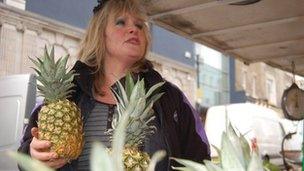Cost of living: Chunks of data to calculate inflation
- Published

Market stallholder Cheryl Collins says that pineapples prove most popular in the summer
Once seen as a symbol of wealth and hospitality, the pineapple will now be among the items used to calculate the cost of living.
Its popularity has developed from the exotic fruit which amazed the explorer Christopher Columbus to a regular part of the UK diet.
So much so that it has now found itself added to the "typical" basket of goods and services used by the Office for National Statistics (ONS) to calculate inflation.
The move comes as no surprise to one experienced stallholder on west London's Portobello Market.
"I've been here for 70 years, love, and I've sold thousands of them," she says.
Nostalgia
The ONS has a basket of 700 items. It collects 180,000 individual prices of these items to work out the rate of inflation - which in turn is used to recalculate pensions, benefits, rail fares and more each year.
The ONS updates the basket of goods every year, reflecting advancing technology, changing tastes and consumers' spending habits.
In the 1950s, the mangle, crisps and dance hall admissions were added to the basket, with soap flakes among the items taken out.
Two decades later, the cassette recorder and dried mashed potato made it in, with prunes being excluded.
Then after the turn of the century, mobile phone handsets and fruit smoothies were included. The old fashioned staples of an evening at home - gin and slippers - were removed from the basket.
So now, in 2012, it is the turn of tablet computers to be added to mark the growing popularity of this type of technology.
That received the most coverage when it was added to the basket of goods, with the ONS highlighting this digital-age addition in its media releases.
But those seafaring captains who once used the then unusual fruit as a symbol to show they were home and hosting might be astonished to find that centuries on, the pineapple has also been added to the inflation basket.
Cameras with films can now be found on antique stalls, as people move to digital
Technically, the pineapple has been added to give more varied coverage in the basket of fruit and vegetables, the prices of which can be volatile.
Back at Portobello Market, greengrocer Cheryl Collins says that price is a key factor when people are deciding whether to buy a pineapple.
"They only buy them when they are cheap," she says, standing next to a punnet of pineapples priced at Ā£1.50 each. They will fall to 50p each later in the year.
"They buy them when they are full of flavour in the summer, when they feel like carving them up. We also get a lot of people on diets buying them."
While consumers may be spending more on tablet computers and, possibly, pineapples, they are not paying to develop camera film much anymore.
The shift to digital cameras and smartphones means that the cost of processing colour film has been removed from the inflation basket.
A signal of these changing attitudes can be seen among the market stalls. The cameras that many people used to take on their summer holidays can now be found on the antiques stall.
Cameras are on sale with prices ranging from Ā£15 to Ā£130, the stallholder says, but many people just come to look and reminisce. People need "passion" to use these old cameras still, he says.
Users might now need to shop online to buy the films - a sign that their use has become more of a niche activity - and some cameras need to be adapted for these films to work.
Teenage kicks
Fiction books for teenagers are among the additions to the inflation basket of goods.
Fiction books for teenagers often command their own section in stores
At Daunt Books, close to Portobello Market, staff show little surprise at their inclusion.
"Children's fiction has not taken a hit in sales like adults' hardback novels, and there are lots of series that are cool," says bookseller Charlotte Colwill.
Two shelves in the shop are assigned for books for teenagers. Alongside older classics such as the Adrian Mole series are titles aimed at teenage fantasy.
Lots have references to "blood" or "battle". One of the most popular - The Hunger Games - has a storyline trailed with the phrase "Winning will make you famous, losing means certain death".
Such subjects have clearly appealed to younger readers, because the ONS says that spending on these books has justified them being added to the inflation basket.
It all seems very different to the 1950s and the inclusion of the mangle.